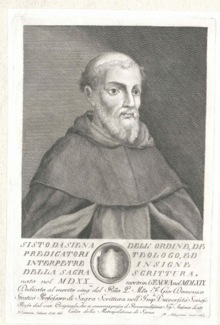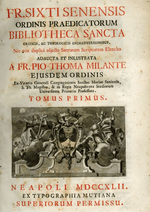Sixtus of Siena
Sixtus of Siena (or Sixtus Senensis) (1520–1569) was a Jew who converted to Roman Catholicism, and became a Roman Catholic theologian. Though he was convicted of heresy he was saved by a Dominican inquisitor, the future Pope Pius V, who repealed the condemnation when Sixtus recanted and pledged to transfer to the Dominican Order instead. He is considered one of the two most outstanding Dominican scholars of his generation.[1] He had as a master Lancelotto Politi, some of whose writings he later publicly criticised.

Sixtus coined the term deuterocanonical to describe certain books of the Catholic Old Testament that had not been accepted as canonical by Jews and Protestants but which appeared in the Septuagint, and the definer for the Roman Catholics of the terms protocanonical and the ancient term apocryphal.[2]

His work Bibliotheca sancta ex præcipuis Catholicæ Ecclesiæ auctoribus collecta[3] (Venice 1566) treats the sacred writers and their works, the best manner of translating and explaining Holy Writ, and gives a copious list of Biblical interpreters, in eight books. It was the first of the genre of encyclopedic teaching repertories of dogma and Church tradition issued in the wake of the Council of Trent.
Notes
- The other being Santes Pagnino (Benedict Ashley, History of the Dominican Order).
- Bibliotheca sancta, Lyon, Pesnot 1575, reprint Leiden, IDC 1988, vol. 1, pp. 13-14
- "Sacred library collected from the precepts of the authorities of the Catholic Church".
Further reading
- John Warwick Montgomery, 1963. "Sixtus of Siena and Roman Catholic Biblical Scholarship", Archiv für Reformationsgeschichte 54 p. 214ff.
- Fernando Dominguez, "Sixtus von Siena", in: Lexikon für Theologie und Kirche 3 IX, 647.
- Elias H. Füllenbach, Bibel- und Hebräischstudien italienischer Dominikaner des 15. und 16. Jahrhunderts, in: Bibelstudium und Predigt im Dominikanerorden. Geschichte, Ideal, Praxis, ed. by Viliam Stefan Doci und Thomas Prügl, Rome 2019 (= Dissertationes Historicae, vol. 36), p. 255-271.